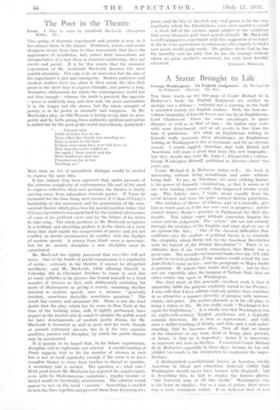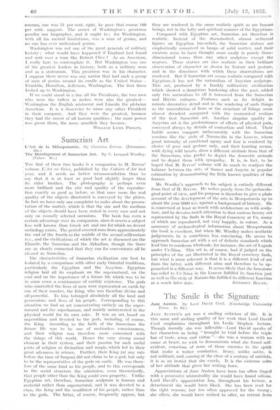A Statue Brought to Life
THE three words on the title-page of Count Michael de Ia. Bedoyere's book—An English Judgment—are neither an apology nor a defence ; certainly not a warning, as the book is intended mainly for English readers. Well, the best one- volume biography of Lincoln I ever saw was by an Englishman, Lord Charnwood. There are some advantages in space distance as well as in that of time ; the author may write with more detachment, an at all events is free from the bias of patriotism. Yet while an Englishman writing on Lincoln really possesses these advantages, an Englishman writing on Washington is not so fortunate, and for an obvious reason. I would suggest, therefore, that both British and Americans will learn a good deal from this new biography ; but they should also read Mr. John C. Fitzpatrick's volume, George Washington Himself, published in America about two years ago.
Count Michael de la Bedoybre writes well ; his book is interesting without being sensational, and sober withdut being dull. To me, an American, the most striking feature is his power of dramatic visualization, so that it seems as if one were reading about events that happened twenty years ago. This felicity rises, I think, about equally from hiS vivid interest and from his quite natural British patriotism.
The mistakes of Howe, of Clinton, and of Cornwallis, giVe him as much pain as if the war were now in progress ; and he cannot forgive Burke's speeches in Parliament for their dis- loyalty. This rather eager attitude somewhat impairs his vision and his judgement. The " rebels " did not win entirely through the mistakes of the English: and what shall we say of an opinion like this :. " One of the classical ,difficulties that confronts (sic) the student of political theory is to reconcile the sympathy which Burke felt for the American Revolution with his hatred of lithe French Revolution " ? There is no difficulty here if one merely remembers that Burke was a great man. The remarks on General Charles Lee (pp.,170, 180) would be revised perhaps, if the author would reread the late John Fiske's essay on Lee ; and the paragraph on Major Andre is partisan. He admits that Andre died justly ; but he does not see, especially after the hanging of Nathan Hale, that no other course was open to Washington. The chief merit of this generally excellent work is that it admirably fulfils the purpose explicitly stated in the Preface ; I'May add that I have seldom read any preface that combines hi so attractive a manner sincerity of purpose with humour, charm, and grace. The author planned, as in the old play, to bring a statue to life. He has really made " Washington live again for Englishmen.", . It is wholly true that Washington was an eighteenth-century English gentleman, not a typically colonial American. He is here so represented ; and with such a skilful. handling of details, and with such a real under standing, that he becomes alive. Now all that we know of the character of any man, dead or living, past, present, or future, is that he is imperfect ; hence it is inaccurate to represent any hero as flawless. I commend Count Michael de la Bedoyere, especially in these days, because he has not yiehled too much to the temptation to emphasize the imper- ket ions.
A distinguished constitutional lawyer in America, wholly American in blood and education, believed (1984). that WaShington should never have broken with England; bat in describing him, he had to employ the famous phrase, " u!.e foremost man of all this • world." Washington was in his heart an idealist ; but as a man of action, there never was a more consistent realist. If he believed that of two
courses, one was 51 per cent right, he gave that course 100 per cent, support. The secret of Washington's greatness puzzles our biographer, and it ought to ; for Washington, with all his mental limitations, was a man of genius, and no one has ever understood genius.
Washington was not one of the great generals of military history ; what would have happened if England had found and sent over a man like Robert Clive ? As an American, I really hate to contemplate it. But Washington was 'One of the greatest leaders in history, both as a military man and as a statesman. This greatness was in his character. suppose there never was any nation that had such a group Of men of genius around its cradle as the United States- ' 'Franklin, Hamilton, Jefferson, Washington. The first three looked up to Washington.
If we could stand in a line all the Presidents, the two men who were the tallest in inches were also the greatest-- Washington the English aristocrat and Lincoln the plebeian American. It is a disservice to name any other President in their company. And they were the greatest, because they had the rarest of all human qualities ; the more power was given them, the more unselfish they becaine.
WILLIAM LYON PHELPS.











































 Previous page
Previous page